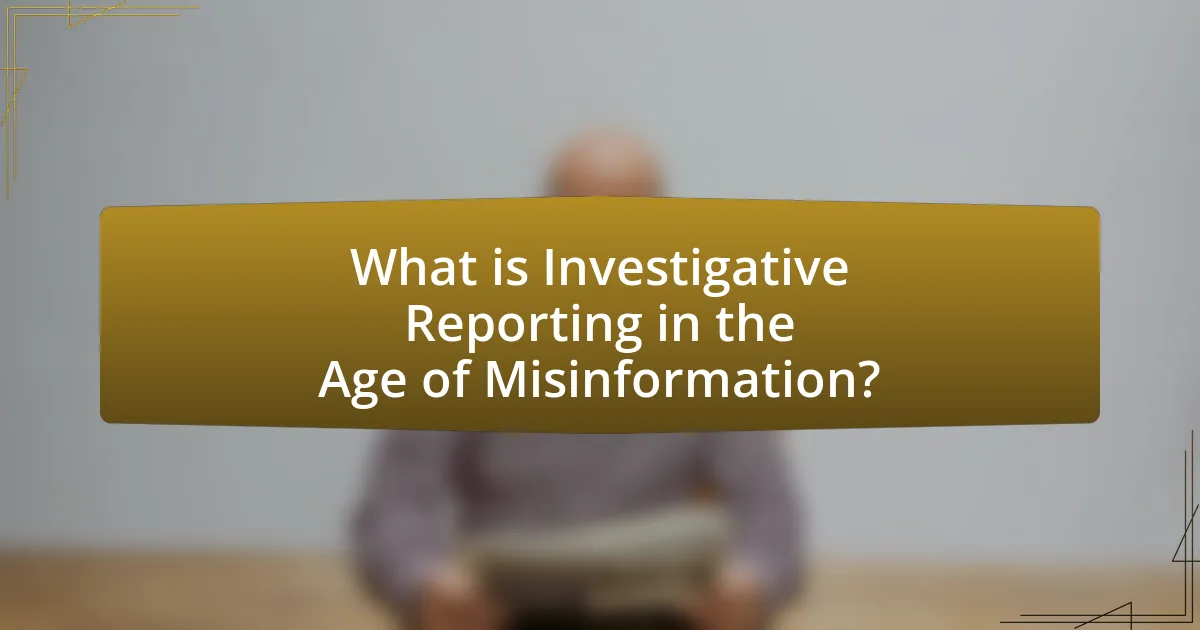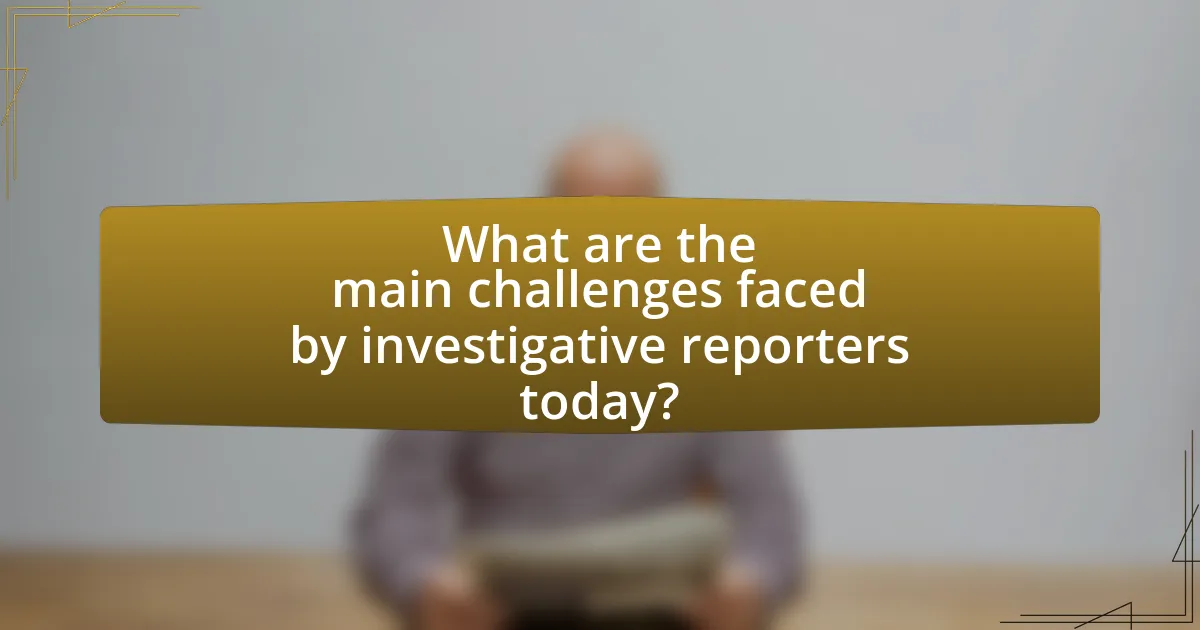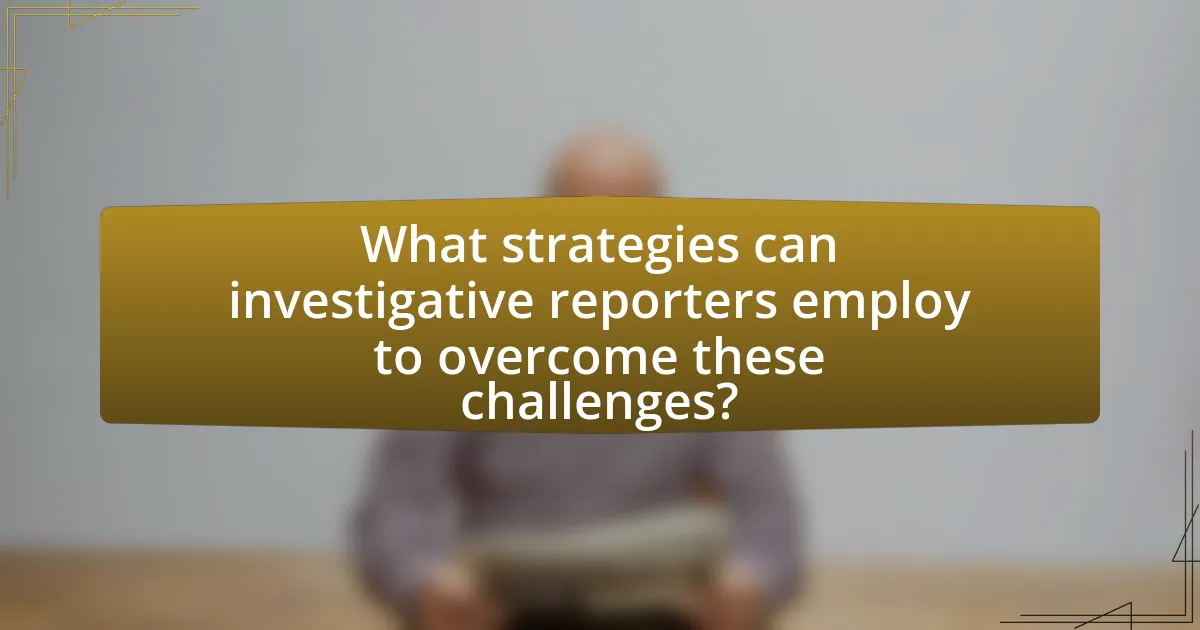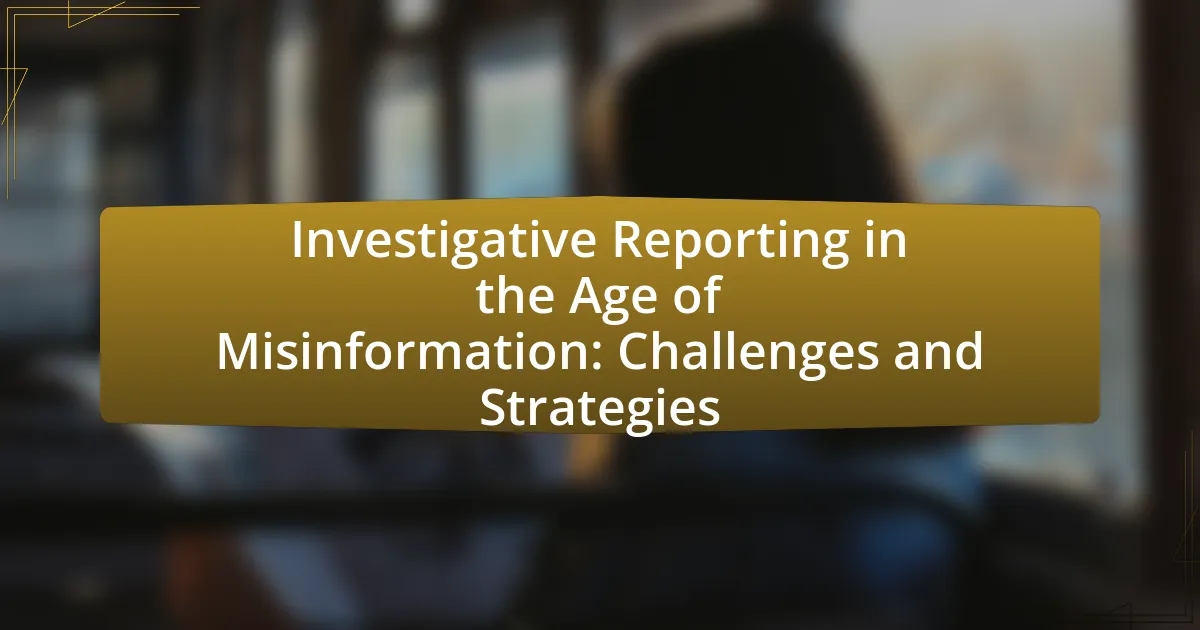Investigative reporting is a critical journalistic practice aimed at uncovering truths behind complex issues such as corruption and abuse of power, particularly in an era marked by rampant misinformation. This article explores the challenges faced by investigative journalists, including the difficulty of verifying facts amidst false narratives, threats to press freedom, and limited resources. It highlights key characteristics of modern investigative reporting, such as thorough research and accountability, and discusses strategies for combating misinformation, including fact-checking and collaboration with experts. Additionally, the article emphasizes the importance of audience engagement and the role of technology in enhancing the effectiveness of investigative journalism.

What is Investigative Reporting in the Age of Misinformation?
Investigative reporting in the age of misinformation is a journalistic practice focused on uncovering the truth behind complex issues, often involving corruption, fraud, or abuse of power, while navigating a landscape saturated with false information. This form of reporting relies on rigorous research, fact-checking, and the verification of sources to ensure accuracy and credibility, which is increasingly vital as misinformation can easily spread through social media and other platforms. For instance, a study by the Pew Research Center found that 64% of Americans believe that misinformation has a significant impact on public opinion, highlighting the necessity for investigative journalists to combat false narratives with well-documented evidence and thorough reporting.
How has the rise of misinformation impacted investigative reporting?
The rise of misinformation has significantly complicated investigative reporting by increasing the difficulty of verifying facts and sources. Investigative journalists now face the challenge of distinguishing credible information from false narratives, which can lead to misreporting and erode public trust in media. A study by the Pew Research Center in 2020 found that 64% of Americans believe that misinformation has made it harder to know what is true, highlighting the pervasive impact of false information on public perception. Consequently, investigative reporters must invest more time and resources in fact-checking and source verification, often resulting in slower reporting processes and heightened scrutiny of their work.
What are the key characteristics of investigative reporting today?
The key characteristics of investigative reporting today include thorough research, transparency, and a focus on accountability. Investigative reporters conduct in-depth investigations that often involve extensive data analysis, interviews, and document reviews to uncover hidden truths. Transparency is crucial, as reporters must disclose their methodologies and sources to build trust with the audience. Additionally, the emphasis on accountability drives journalists to hold powerful entities, such as governments and corporations, responsible for their actions. These characteristics are essential in combating misinformation and ensuring the integrity of the news.
How do journalists identify misinformation in their investigations?
Journalists identify misinformation in their investigations by employing fact-checking techniques, cross-referencing sources, and utilizing digital tools to verify claims. They analyze the credibility of information by assessing the reliability of the sources, checking for corroboration from multiple independent outlets, and examining the context in which the information is presented. For instance, a study by the Pew Research Center found that 64% of journalists use fact-checking websites to validate information, highlighting the importance of these resources in combating misinformation. Additionally, journalists often engage with experts in relevant fields to gain insights and confirm the accuracy of complex claims, further enhancing the integrity of their reporting.
Why is investigative reporting crucial in combating misinformation?
Investigative reporting is crucial in combating misinformation because it uncovers the truth behind false narratives and provides verified information to the public. This form of journalism employs rigorous research methods, fact-checking, and source verification, which are essential in distinguishing credible information from misleading claims. For instance, a study by the Pew Research Center found that investigative journalism significantly increases public trust in media when it exposes inaccuracies and holds powerful entities accountable. By revealing the facts and context surrounding issues, investigative reporting plays a vital role in informing citizens and fostering an informed society, ultimately reducing the spread of misinformation.
What role does investigative reporting play in public trust?
Investigative reporting plays a crucial role in fostering public trust by uncovering truths that hold powerful entities accountable. This form of journalism provides in-depth analysis and exposes corruption, fraud, and injustices, which enhances transparency in society. For instance, a study by the Pew Research Center found that 70% of Americans believe that investigative journalism is essential for democracy, as it informs citizens and encourages civic engagement. By revealing critical information, investigative reporting not only informs the public but also builds credibility for media organizations, reinforcing the trustworthiness of journalism as a whole.
How does investigative reporting contribute to accountability?
Investigative reporting contributes to accountability by uncovering truths that hold individuals and institutions responsible for their actions. This form of journalism often reveals corruption, misconduct, and abuse of power, which can lead to legal consequences and policy changes. For instance, the Watergate scandal investigation by journalists Bob Woodward and Carl Bernstein resulted in the resignation of President Richard Nixon, demonstrating how investigative reporting can directly impact governance and accountability. By providing evidence-based findings to the public, investigative reporting fosters transparency and encourages civic engagement, ultimately promoting a more accountable society.

What are the main challenges faced by investigative reporters today?
Investigative reporters today face significant challenges, including the rise of misinformation, threats to press freedom, and limited resources. Misinformation complicates the verification of facts, making it harder for reporters to distinguish credible sources from unreliable ones. Threats to press freedom, such as legal intimidation and violence against journalists, create an environment of fear that can hinder thorough investigations. Additionally, many news organizations have reduced budgets, leading to fewer resources for investigative reporting, which often requires extensive time and funding. These challenges collectively undermine the effectiveness and safety of investigative journalism in the current media landscape.
How does misinformation complicate the investigative process?
Misinformation complicates the investigative process by obscuring the truth and leading investigators to pursue false leads. When inaccurate information circulates, it can misdirect resources and attention, causing delays and potentially compromising the integrity of the investigation. For instance, a study by the Pew Research Center found that 64% of Americans believe that misinformation has made it harder to distinguish between accurate and inaccurate news, which directly impacts the ability of journalists and investigators to verify facts. This confusion can result in the dissemination of incorrect narratives, further complicating the investigative process and undermining public trust in the media.
What specific obstacles do journalists encounter when verifying facts?
Journalists encounter several specific obstacles when verifying facts, including the prevalence of misinformation, lack of access to reliable sources, and time constraints. The rise of social media has significantly increased the spread of false information, making it challenging for journalists to discern credible facts from misleading narratives. Additionally, journalists often face difficulties in accessing primary sources or official data, which can hinder their ability to confirm information accurately. Time constraints further complicate the verification process, as journalists may be pressured to publish quickly, sometimes at the expense of thorough fact-checking. These obstacles collectively undermine the integrity of journalistic reporting in an era characterized by widespread misinformation.
How do legal and ethical considerations affect investigative reporting?
Legal and ethical considerations significantly influence investigative reporting by establishing boundaries that protect individuals’ rights and ensure journalistic integrity. Investigative reporters must navigate laws such as defamation, privacy, and copyright, which can limit the scope of their inquiries and the information they can publish. For instance, defamation laws require journalists to verify facts to avoid legal repercussions, while privacy laws restrict the disclosure of personal information without consent. Ethical guidelines, such as those set by the Society of Professional Journalists, emphasize the importance of accuracy, fairness, and accountability, compelling reporters to conduct thorough research and present balanced viewpoints. These legal and ethical frameworks not only safeguard the subjects of investigations but also enhance the credibility of the reporting itself, as adherence to these standards fosters public trust in journalism.
What technological challenges do investigative reporters face?
Investigative reporters face significant technological challenges, including data security, information overload, and the need for advanced digital skills. Data security is crucial as reporters often handle sensitive information that requires protection from cyber threats; for instance, the 2017 hacking of the Associated Press highlighted vulnerabilities in journalistic practices. Information overload occurs due to the vast amount of data available online, making it difficult for reporters to discern credible sources from misinformation. Additionally, the rapid evolution of technology necessitates that reporters continuously update their digital skills to effectively utilize tools for data analysis and secure communication, as evidenced by the increasing reliance on encryption software and data visualization tools in modern journalism.
How has social media changed the landscape of investigative reporting?
Social media has transformed investigative reporting by providing immediate access to information and facilitating real-time engagement with audiences. Journalists now utilize platforms like Twitter and Facebook to gather leads, share findings, and crowdsource information, which enhances the speed and breadth of investigations. For instance, the 2016 U.S. presidential election saw journalists leveraging social media to uncover and report on misinformation campaigns, demonstrating its role in shaping public discourse. Additionally, social media allows for greater audience interaction, enabling reporters to receive tips and insights directly from the public, thereby enriching the investigative process.
What tools can journalists use to combat misinformation effectively?
Journalists can effectively combat misinformation using fact-checking tools, data verification platforms, and social media monitoring software. Fact-checking tools like Snopes and FactCheck.org allow journalists to verify claims and debunk false information quickly. Data verification platforms such as Google Fact Check Explorer enable journalists to access a database of verified information, enhancing their ability to provide accurate reporting. Additionally, social media monitoring software like CrowdTangle helps journalists track the spread of misinformation across platforms, allowing them to respond promptly and inform their audience. These tools collectively enhance the credibility of journalistic work and support the fight against misinformation.

What strategies can investigative reporters employ to overcome these challenges?
Investigative reporters can employ several strategies to overcome challenges in the age of misinformation, including rigorous fact-checking, building strong networks, and utilizing technology for data analysis. Rigorous fact-checking ensures that information is verified before publication, which is crucial in combating false narratives; for instance, organizations like PolitiFact and FactCheck.org provide resources for verifying claims. Building strong networks with trusted sources enhances the credibility of information gathered, as collaboration with experts can provide deeper insights and corroborate findings. Additionally, utilizing technology for data analysis, such as software for analyzing large datasets or social media trends, allows reporters to uncover patterns and validate claims effectively, as demonstrated by the use of tools like Tableau and Google Trends in recent investigative projects. These strategies collectively strengthen the integrity and impact of investigative reporting in a challenging media landscape.
How can collaboration enhance investigative reporting efforts?
Collaboration can enhance investigative reporting efforts by pooling diverse expertise and resources, which leads to more comprehensive and accurate investigations. When journalists from different backgrounds and organizations work together, they can share information, access a wider range of sources, and combine their skills in data analysis, legal knowledge, and storytelling. For instance, the International Consortium of Investigative Journalists (ICIJ) successfully collaborated on the Panama Papers investigation, which involved over 370 journalists from more than 100 media organizations, resulting in a groundbreaking exposé of global tax evasion. This collaborative approach not only increased the depth of the investigation but also amplified its impact, demonstrating that teamwork can significantly elevate the quality and reach of investigative journalism.
What are the benefits of partnerships between journalists and fact-checkers?
Partnerships between journalists and fact-checkers enhance the accuracy and credibility of news reporting. By collaborating, journalists can access fact-checkers’ expertise in verifying information, which helps to reduce the spread of misinformation. For instance, a study by the American Press Institute found that news organizations that incorporate fact-checking into their reporting see a significant increase in audience trust. This collaboration not only improves the quality of journalism but also fosters a more informed public, as accurate reporting is essential in combating the challenges posed by misinformation in today’s media landscape.
How can cross-border collaborations improve investigative outcomes?
Cross-border collaborations can significantly improve investigative outcomes by facilitating the sharing of resources, expertise, and information across jurisdictions. These collaborations enable investigative teams to access a wider range of data sources, including international databases and local insights that may not be available within a single country. For instance, the Panama Papers investigation exemplified how journalists from multiple countries worked together to analyze vast amounts of data, leading to impactful revelations about global tax evasion. Such cooperative efforts enhance the depth and accuracy of investigations, allowing for a more comprehensive understanding of complex issues that transcend national borders.
What best practices should journalists adopt in the age of misinformation?
Journalists should adopt rigorous fact-checking and verification processes to combat misinformation. This includes cross-referencing information with credible sources, utilizing fact-checking organizations, and employing tools like reverse image searches to verify the authenticity of visual content. According to a 2020 study by the Pew Research Center, 64% of Americans believe that misinformation is a major problem, highlighting the necessity for journalists to maintain high standards of accuracy and transparency in their reporting. Additionally, journalists should engage with their audience to clarify misconceptions and provide context, thereby fostering trust and credibility in their work.
How can reporters ensure accuracy in their investigations?
Reporters can ensure accuracy in their investigations by rigorously verifying information through multiple credible sources. This involves cross-referencing facts, consulting experts, and utilizing primary documents to substantiate claims. For instance, a study by the Pew Research Center found that 64% of Americans believe that fact-checking is essential for accurate reporting, highlighting the importance of thorough verification processes in journalism. By adhering to these practices, reporters can significantly reduce the risk of disseminating misinformation and enhance the reliability of their work.
What role does audience engagement play in effective investigative reporting?
Audience engagement is crucial for effective investigative reporting as it fosters trust, enhances transparency, and encourages community involvement. Engaged audiences are more likely to share information, provide tips, and contribute to the investigative process, which can lead to more comprehensive and impactful stories. For instance, a study by the Pew Research Center found that 64% of Americans believe that local news organizations should engage with their audiences to improve reporting quality. This interaction not only helps journalists gather diverse perspectives but also ensures that the reporting resonates with the community’s needs and concerns, ultimately leading to more informed public discourse.
What practical tips can help journalists navigate misinformation?
Journalists can navigate misinformation by employing fact-checking tools, verifying sources, and cross-referencing information. Fact-checking tools like Snopes and FactCheck.org provide reliable verification of claims, while verifying sources ensures that information comes from credible and authoritative entities. Cross-referencing information with multiple reputable sources helps confirm accuracy and reduces the risk of spreading false narratives. According to a 2020 study by the Pew Research Center, 64% of Americans believe that misinformation is a major problem, highlighting the importance of these strategies in maintaining journalistic integrity.

Leave a Reply